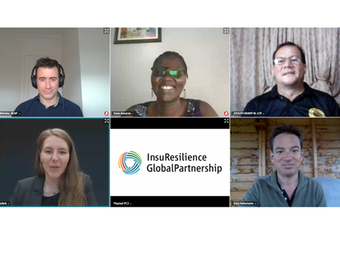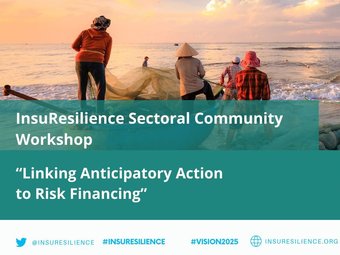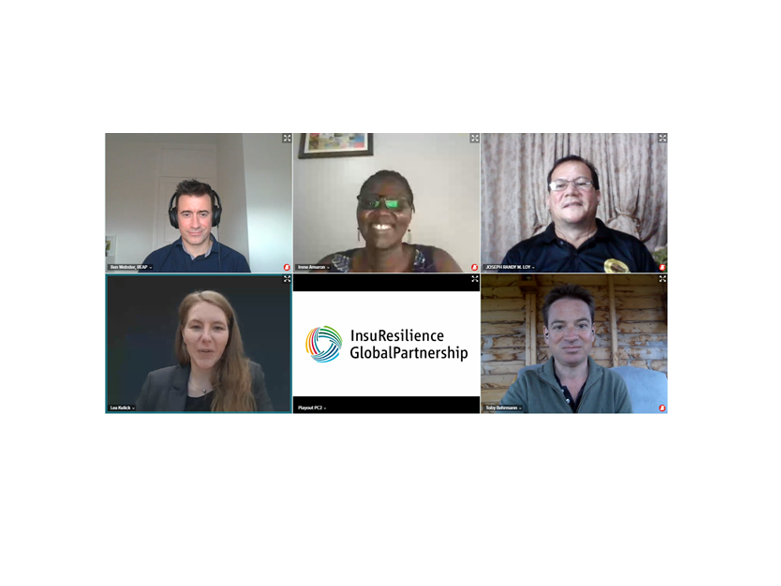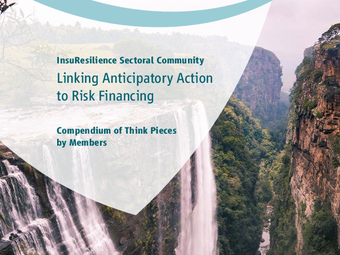Categories
Sectoral Community: Linking Risk Financing to Anticipatory Action
The Linking Risk Financing to Anticipatory Action sectoral community is hosted by the InsuResilience Global Partnership. It seeks to accelerate the scaling up of anticipatory risk financing by unlocking synergies, facilitating community exchange and linking needs and solutions across sectors and organisations.
The community is co-chaired by the Anticipation Hub and the Risk-informed Early Action Partnership (REAP) Secretariat.
Background
Under the InsuResilience Global Partnership, a Working Group on Integrated Approaches was formed to contribute to the Partnership’s Vision 2025 by linking Climate and Disaster Risk Finance and Insurance (CDRFI) to a comprehensive risk-management practice. The Working Group facilitates knowledge exchange and dissemination on new and existing solutions which integrate different disaster risk-financing and insurance tools with other risk-management components. In late 2020, the Integrated Approaches Working Group launched four sectoral communities to increase the deep-dive into topic-specific discussions, and one of them focuses on Linking Disaster Risk Financing to Anticipatory Action. To foster synergies, the InsuResilience Secretariat joins forces with the Anticipation Hub and the Secretariat of the Risk-informed Early Action Partnership (REAP) to bring this sectoral community to life.
Anticipatory action has gained significant momentum within the humanitarian sector in recent years. Alongside the Red Cross and Red Crescent Network and the World Food Programme (WFP)’s pioneering work in the form of Forecast-based Financing (FbF), other humanitarian agencies such as the Start Network, the Food and Agriculture Organization (FAO), and more recently, the UN Office for the Coordination of Humanitarian Affairs (OCHA) are funding and developing similar approaches. Globally pooled funds such as the DREF and CERF have components that allow for anticipatory action to get funded based on risk analysis and forecast, coupled with pre-agreed plans. In addition, first pilots to integrate early warning systems and forecast-based indexes into risk transfer solutions are increasingly emerging. These initiatives also complement the wider work by the development and climate community to strengthen governments’ systems through innovative disaster risk financing tools. Building on the successful piloting efforts of recent years, the vision now is to scale up and mainstream anticipatory action as an approach across DRM processes and frameworks.
Scaling up means dedicating more funding to expand anticipatory action so that more people can receive assistance ahead of predictable shocks. It also means expanding the geographic coverage and types of shocks that can be anticipated, as well as the ability and capacity of the system to respond collectively in a coordinated manner. Therefore, scaling up is not just more, it also means better. The shift from ex post disaster response to ex ante anticipatory action needs to be backed up with sufficient resources. This requires a greater technical exchange and coordination between the disaster risk financing initiatives and instruments being set up by government and humanitarians at global, regional or national level. Catalyzing an earlier, more effective disaster response requires integrated disaster risk financing systems; that is, harmonized trigger systems where funds are released and anticipatory action implemented in a coordinated way according to aligned plans. Partners would act in a harmonized way, not necessarily all for the same events or at the same time but reflecting their specific mandates, relative strengths and capacity.
Objectives & deliverables
Overall, this sectoral community on Linking Risk Financing to Anticipatory Action seeks to accelerate the scaling up of risk financing for anticipatory action by unlocking synergies, facilitating community exchange and linking needs and solutions across sectors and organisations. It will do so by pursuing the following objectives:
Foster structured and focused exchange by bringing together expertise from different sectors, while strengthening synergies between the sectoral community and other relevant initiatives.
Provide and update an overview of existing and new risk financing approaches for anticipatory action.
Co-create and jointly (further) develop solutions to drive forward innovation and piloting of new risk financing solutions.
Link needs with solutions by establishing dialogues between solution providers and beneficiary groups, moving more towards implementation and coordination on the ground.
Contribute to/support the evidence base for policy advocacy to mainstream early action and risk financing at scale.
The expected deliverables include 1) Clear definition of the scope for the community (terms, solution space, boundaries of focus) 2) Overview of existing and new risk financing solutions and approaches for anticipatory action, and 3) Workshop on co-creation of innovative solutions, including development of a work plan.
Membership
The membership includes organisations who are working on linking risk financing and anticipatory action or have strong ambitions to do so. Please get in touch with the co-chairs and InsuResilience Secretariat below for more information.
Activities
Further knowledge resources
Access knowledge resources helping to inform thinking and learning on linking Risk Financing to Anticipatory Action.
Read more here




